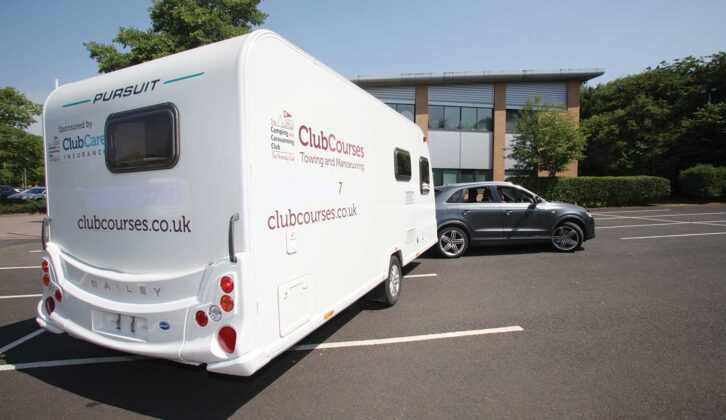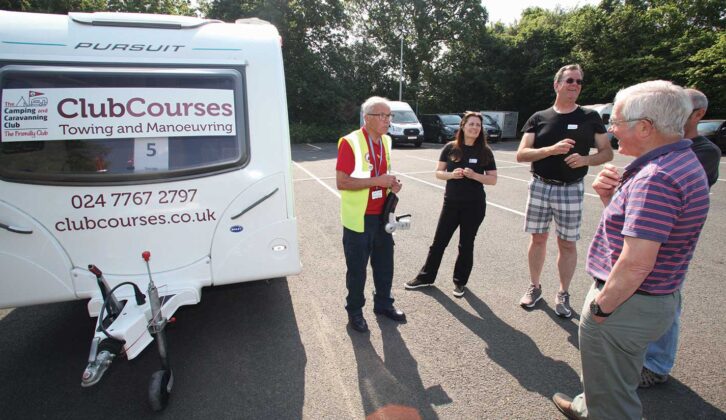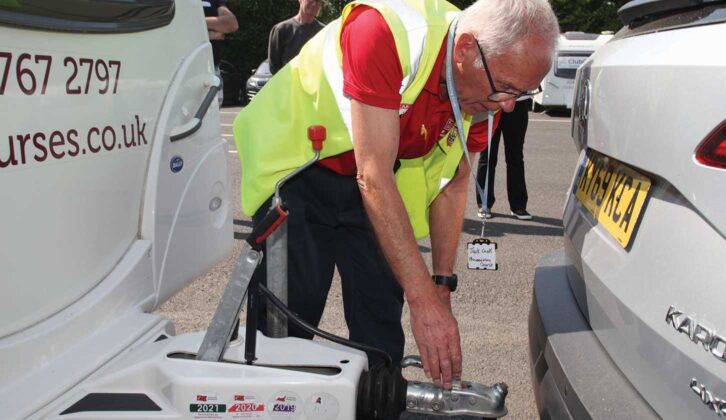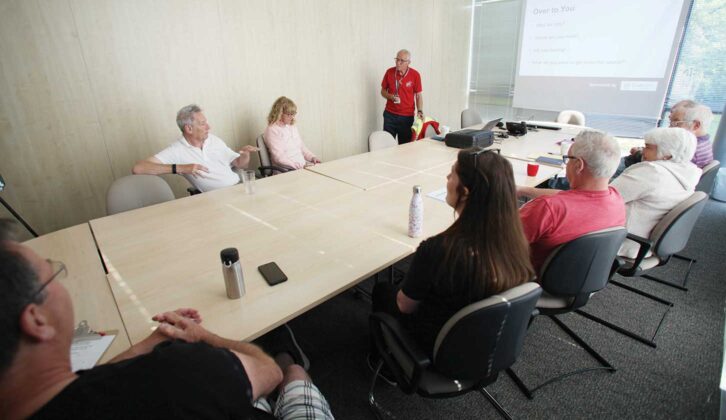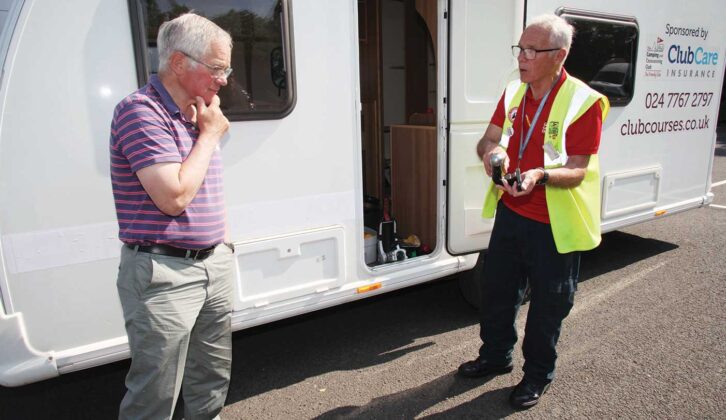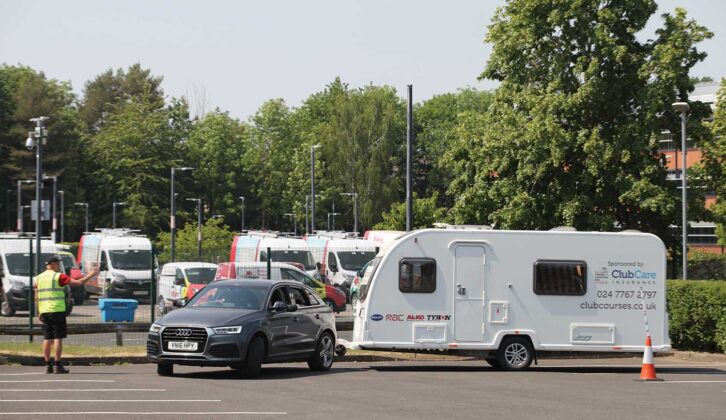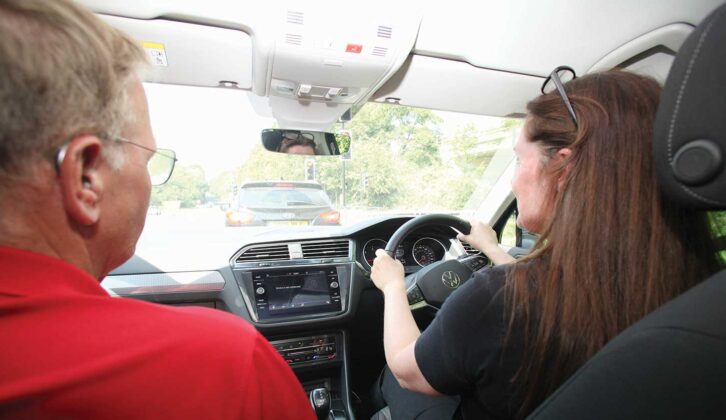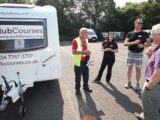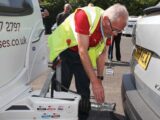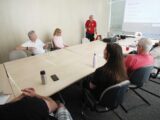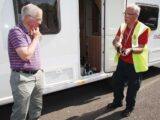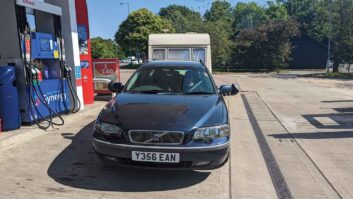I remember my first caravan towing course very well – particularly the nerves. I’m pretty sure we were all thinking that we might make fools of ourselves in front of the other trainees.
I needn’t have worried, though, because that course is still one of the best things I’ve done, and since then, I’ve been on several refresher caravan towing courses, and photographed quite a few more.
So I’ve experienced first-hand how these courses are simply transformative. Nervous towing novices who are new to caravanning rock up in the morning, terrified of embarrassing themselves, but by the time they leave, they’ve been armed with all the basic knowledge and techniques to tow their caravan confidently, and they’ve proved to themselves that they can do it.
In total, I’ve seen about 50 candidates attending one of these towing lessons, and all 50 of them (me included!) came away ready and raring to tow.
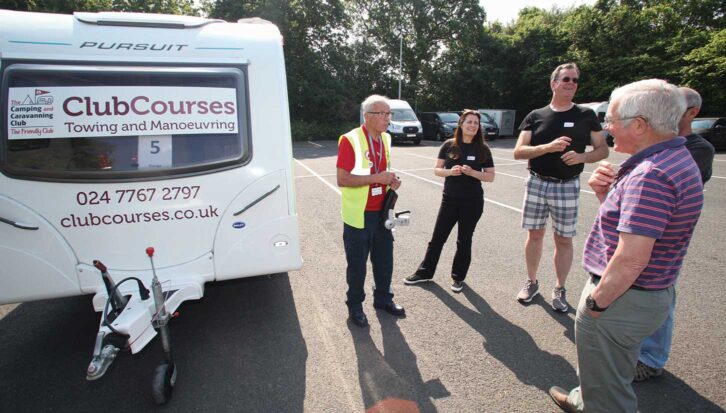
All of those experiences have made me a passionate advocate of towing and practical courses for caravanners, the best of which are delivered by the two major caravan clubs.
I believe basic towing training should be compulsory, because towing up to 2000kg of white box down a motorway at the caravan speed limit of 60mph, without preparation, doesn’t seem wise.
The other bonus for caravan towing tuition participants is that many insurance providers then offer discounts, typically around 5%.
The towing tuition is run by caravanning and driving experts – all of them friendly and helpful people – and places can be booked online from The Camping and Caravanning Club or the Caravan and Motorhome Club.
Caravan towing courses
The Camping and Caravanning Club towing courses
The Camping and Caravanning Club offers two types of tuition. These are a Confidence Builder course (members £160, non-members £185) and a Pitch and Progress course (members £175, non-members £200).
Each course takes place on one day, although they can be combined into a two-day, weekend course. The Club offers a 25% discount at the nearby Kingsbury Water Park Club Site for two-day participants.
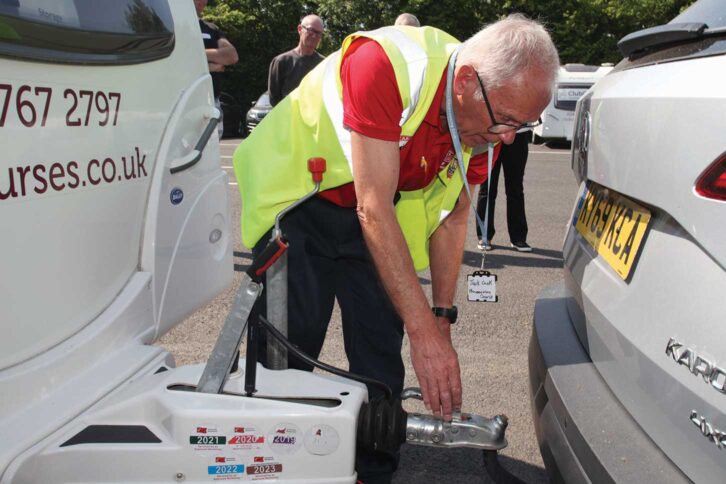
All Camping and Caravanning Club training courses take place at the Club HQ, near Coventry (CV4 8JH).
The Caravan and Motorhome Club towing courses
The Caravan and Motorhome Club also offers two courses.
Its Practical Caravanning training course is ideal for first-time caravanners and costs £204 per person for 10.5 hours of training over two days.
For drivers with more experience of towing, the Club’s Caravan Manoeuvring course is a great way to refresh or hone and improve your towing skills. It costs £174 per person and lasts for 6.5 hours on a single day.
The Club carries out tow training at 18 sites across Scotland, England, Wales and Northern Ireland:
- Askham Bryan College, York
- Boston LGV Training, Lincolnshire
- Caravan and Motorhome Training Ltd, Worcester
- City Driver Training, Sheffield
- DHT Training Solutions Ltd, County Durham
- Go!Driving, York
- Grangemouth, Alan Brown, Stirlingshire
- Hills Driver Training, Plumpton, East Sussex
- Keep Legal Ltd, South Ockendon, Essex
- Ken Irwin Class One Driver Training, N Ireland
- Lancaster Driver Training
- P Vowles Training, Figheldean, Wiltshire
- RoadSafe Wales, Llanelli, Carmarthenshire
- Sparsholt College, Winchester, Hampshire
- Tilston Training, Llay, Wrexham
- Towing Solutions, Macclesfield, Cheshire
- WSM Training, Dumfries
- Caravan and Motorhome Training Ltd, Edgmond, Shropshire
What you’ll learn from caravan towing lessons
Camping and Caravanning Club
Confidence Builder
This course covers all the basics, including how to load a caravan, the stages to levelling a caravan, the steps to hitching and unhitching, the towing laws to be aware of, how to reverse a caravan, how to navigate a slalom course, and a one-on-one session with an instructor on the road. I actually took part in this to find out more about it – read what it was like below.
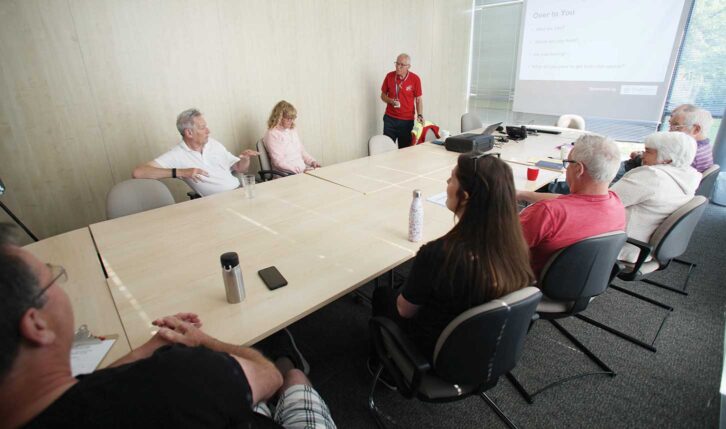
Pitch and Progress
This course is a follow-up to the Club’s Confidence Builder training, which will help you develop your skills further.
On the Pitch and Progress course, you’ll spend 2.5 hours on the road with an experienced instructor, towing a caravan on a varied route that will deliver a good selection of real-world caravanning experiences and challenges.
These include handling hill-starts, and towing on narrow roads, motorways and dual carriageways. In adddition, you’ll also learn to pitch your van on site.
Caravan and Motorhome Club
Practical Caravanning
On this excellent course, you’ll learn all of the basics to do with hitching up a caravan and safely towing it.
You’ll be taught how to manoeuvre confidently, including those simple little tricks that help to make it easy.
Participants are also shown how to load a caravan, and how packing your caravan affects the way it tows. This ties in with the Caravanning and the Law section, and Everyday Safety Checks.
Finally, for the pièce de résistance, the trainers will teach you how to reverse around a corner. After that, the towing world is your oyster!
Caravan Manoeuvring
This intensive manoeuvring training will furnish you with all of the tricks and tips necessary to tow your caravan confidently and expertly in any circumstances, from accessing a tight pitch to carrying out a three-point turn with a caravan in tow. It covers straight-line reversing, nearside and offside reversing around a bend, and levelling (front, rear and side-to-side).
What you need to bring to your caravan towing lessons:
- Current standard driver’s licence. Most courses involve on-road towing, so you must be legal to drive.
- You’ll train in your own car, which must be fitted with a legal towbar and a 13-pin electric socket receiver. Your car must have a minimum of 70-80mm between the bumper and the centre of the towball to allow for tow hitch clearance.
- A minimum of third-party liability cover for your car. You might want to tell your insurer you plan to tow a caravan.
- Two external towing mirrors – see our best towing mirrors guide for a hand with picking yours.
What to expect from caravan towing lessons
I took on a C&CC Confidence Builder towing course to find out more
It promised to be a sunny day as I drove into the car park at the C&CC HQ near Coventry. Eight candidates were training that day, and I would be photographing and filming them as they undertook the day’s caravanning challenges.
After coffee, name-badge writing, some friendly chat and the obligatory check on driving licences (see: our guide to the correct licence for towing a caravan), we headed into the initial briefing, where brilliant course leader Jack Cook enlightened the group about the day’s proceedings.
Jack started by assessing everyone’s towing experience, which ranged from zero to very little – this cohort definitely had ‘enthusiastic newbie’ status.
He then revealed what the day had in store: hitching up, loading and levelling, slalom manoeuvre and an on-road driving assessment. The briefing ended with a short quiz – future candidates should make sure they swot up on speed limits and caravan weight abbreviations!
By now, everyone was getting into the swing of things and feeling more relaxed, so it was time to head outside and get to grips with the big white boxes.
The eight participants were divided into two groups of four. One group began with hitching, loading and levelling, with Jack, while the others got straight behind the wheel and either took on the slalom challenge with Andy, or headed out onto the streets of Coventry with David for an assessment. I stayed with Jack’s group.
Hitching essentials
Jack started by explaining how an Al-Ko tow-hitch works, including how friction pads are removed from the stabiliser for cleaning. He then ran through towball maintenance and the value of fitting Tyron wheel safety bands.
Mick, Mike, Eddie and Lisa were all ears and had lots of questions, while Jack revealed his repertoire of caravan-based gags! Next up, he went through all of the moving parts on the A-frame, and how Al-Ko ATC works. Then he told us about caravan noseweights, and how to use a noseweight gauge.
Across the car park, we could see Elaine sweeping through the cone slalom and making some pretty extreme manoeuvres with aplomb. High standards were clearly being established here.
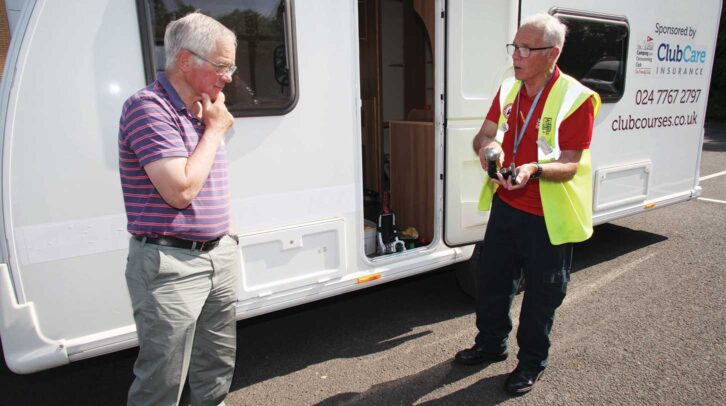
When Jack asked for the first hitching volunteer, Lisa jumped into her car and reversed up to the hitch, guided by Jack using the traditional arm-over-the-hitch method. Lisa got her towball straight under the hitch first time, and I could see the others looking on with trepidation.
Jack ran them through the hitching technique, then unhitched so that Lisa could do it herself.
After hitching, each candidate had to drive in tight circles around the car park and make the manoeuvre that Jack calls The Wiggle. This is a seemingly impossible, yet simple, move to straighten a caravan that’s at almost 90° to the caravan tow car – in a distance of just a metre or so! It looks like a ridiculous undertaking, but sure enough, with Jack’s direction, it worked a treat. Lisa soon had her outfit aligned in a parking bay with minimal effort.
Each of the four trainees watched the others hitch and got to do it themselves, so these important messages were well and truly reinforced.
The course is nothing if not thorough, and Jack also incorporated lateral and end-to-end levelling into the session. Of course, the mandatory light check was carried out after each hitching.
With the relentless sun slowly broiling everybody, it was time to break for lunch, to enjoy a much-needed drink and a good discussion about the morning’s activities.
Slalom challenge
After lunch, my group moved on to the slalom course and city drive. Lisa and Mike were the first to hit the cones (not literally!). Lisa gently towed in and out of the cones with expert guidance from Andy. It’s not hard work, but it’s all about remembering the lines, when to turn and how fast to spin the steering wheel.
Once again, it all looked pretty much impossible, but with the right technique, the caravan danced to the tune of our rapidly improving tow-car drivers.
“Keep coming in a straight line,” instructed Andy, “then as soon as the front of the van’s aligned with a cone, steer hard to the left.”
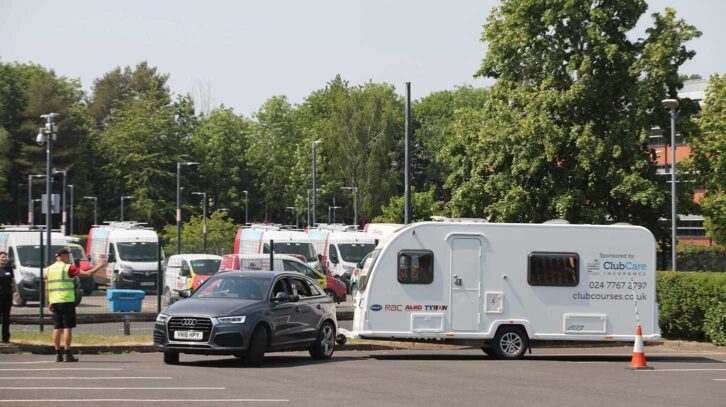
If you’d asked me, I’d have thought that was way too early to turn in, as the caravan wheel was a good eight feet behind; but sure enough, the van rolled straight on for some distance, even though the tow car was turning sharply.
The side of the van slid easily past the cone, until the back end was clear, then Lisa was locking it over in the other direction. After three runs, she was doing flawless zig-zagging in and out of the cones. At the end of the slalom, there was another impossible-looking turn, to manoeuvre the van through a cone ‘alley’ to exit the course.
That turn requires more extreme steering, with the outfit almost making a U-turn, before swinging back and instantly aligning you with the cones.
In fairness, these challenges were all more extreme than anything I’ve ever encountered when towing, but if you’ve mastered them, everyday towing will be an absolute doddle… or a wiggle!
Out on the road
For the next stage of the course, the group headed out on to the busy roads of Coventry, after first driving through Warwick University campus.
I jumped in with Lisa and David the tutor, who was very calm and clear in his directions, asked lots of questions, and advised Lisa how to plan ahead for a safer and more comfortable tow.
Our route took in everything from country lanes, to inner-city ring roads and terraced streets, and Lisa managed it all smoothly, safely and confidently.
The key to success, David explained, is to look and plan further ahead than most of us do with normal driving, to give clear indications of your intentions early and to take your time. Being aware of what is going on all around you is essential, too, so constant vigilance is crucial.
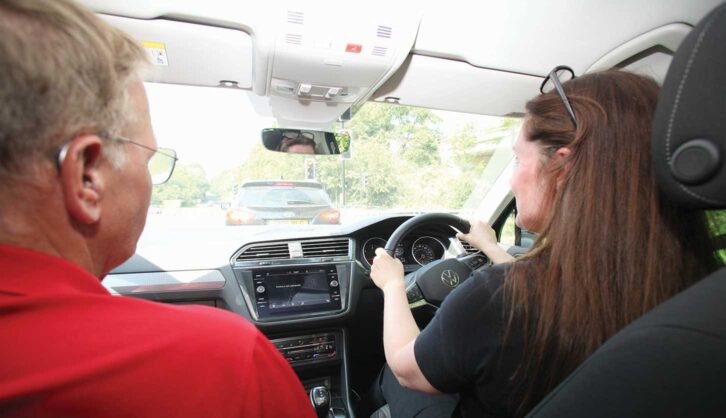
Finally, as the participants were taught throughout the day, you just have to allow more space for turning with a caravan attached, usually turning in a little later and sharper than you typically would.
Lisa arrived back at base brimming with confidence, having completed a near-flawless 45-minute tow – her first!
Then, with the day’s training complete, we headed back inside for a debrief.
All of the eight candidates have been transformed from the nervous newbies who had arrived in the morning, and were full of enthusiasm to discuss how the day went. They’re infinitely more confident.
Having watched them progress through the day, I’m absolutely certain that they would all recommend tow training as 100% worthwhile, too. Job done!
The verdict on caravan towing tuition
My key message here is: Don’t fear the course! I guarantee you’ll come away having had a great time, feeling newly confident about your towing abilities. You may even make a new caravanning friend or two while you’re there.
I would advise anyone to book a course as close to their caravanning holiday as possible, so you then go out on the road as soon as you can, and get those good habits and techniques ‘cemented in’ before the memories and enthusiasm from the training start to fade.
Both Clubs’ caravan towing courses are excellent and offer great value for money, especially as they’ll pay you back with insurance discounts every year afterwards.
Take a look at what you can expect when you’re collecting a caravan for the first time.
If you’ve enjoyed reading this article, why not get the latest news, reviews and features delivered direct to your door or inbox every month. Take advantage of our brilliant Practical Caravan magazine SUBSCRIBERS’ OFFER and SIGN UP TO OUR NEWSLETTER for regular weekly updates on all things caravan related.
